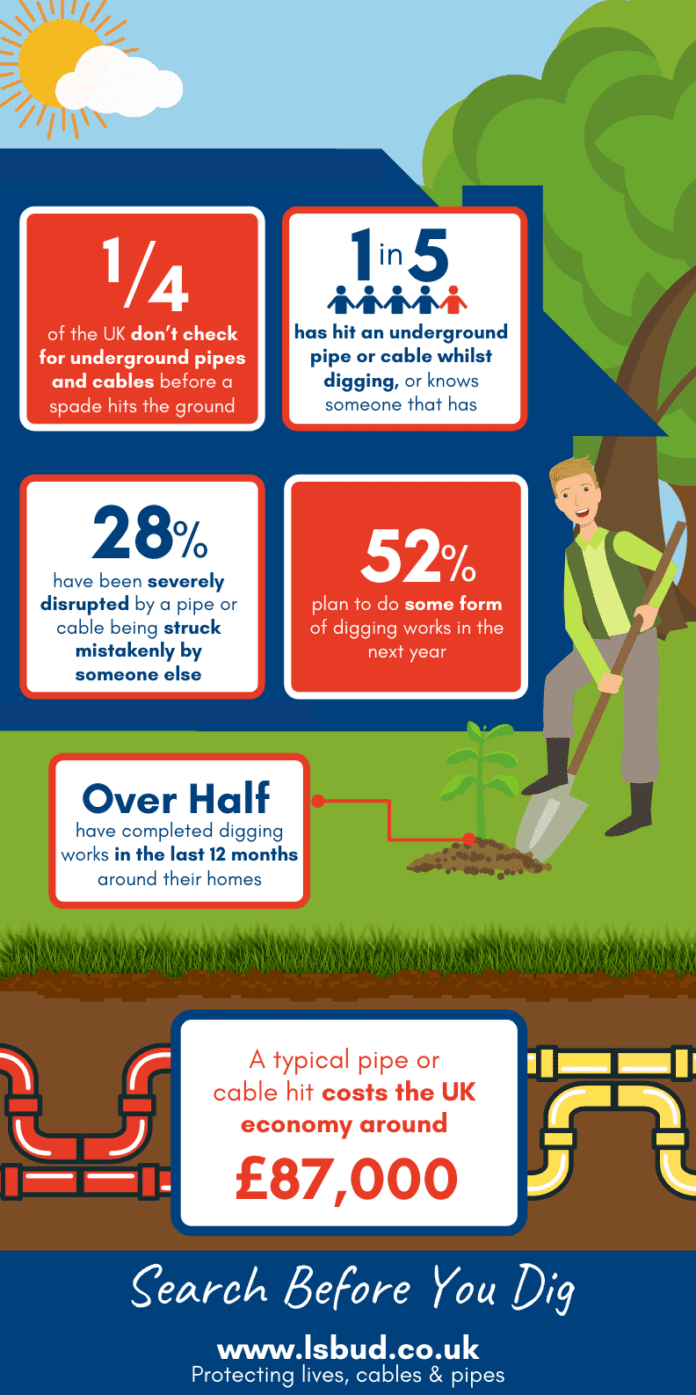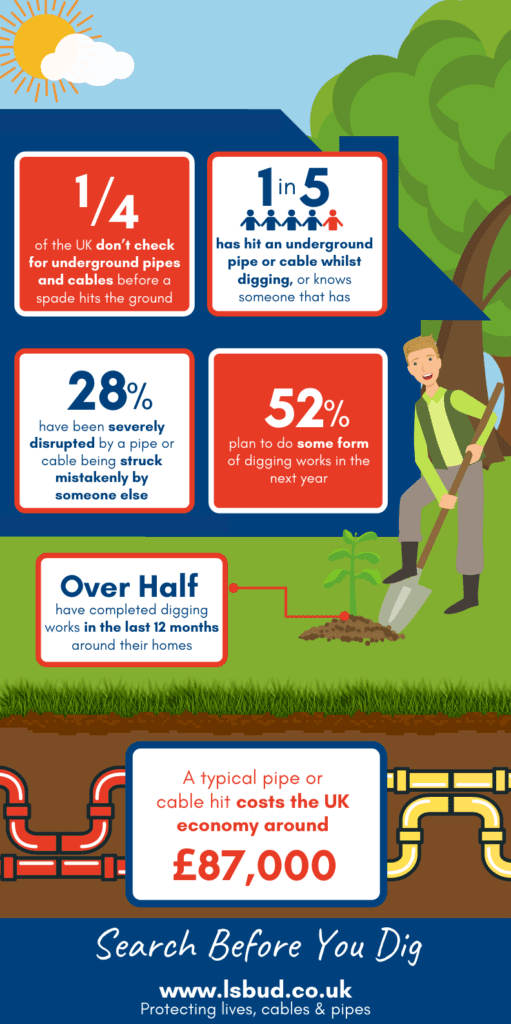More than one in ten people living in Wales have hit an underground pipe or cable whilst digging, or know someone that has, with 15 percent of these incidents resulting in injury, according to new research into safe digging practices in the UK. On top of this, 24 percent of Welsh residents have been severely disrupted by a key pipe or cable being mistakenly struck by someone else.
For some working in specific trades, the problem is even more severe, with more than two in five builders in the UK and 36 percent of farmers admitting to either striking a pipe or cable themselves or knowing a colleague who has.
The study, commissioned by the nation’s leading underground mapping provider, LSBUD, found that 24 percent of people living in Wales don’t bother to check for underground pipes and cables before a spade or digger hits the ground. This is quite an issue as more than half of Brits completed digging works in the last 12 months, and 52 percent plan to do some in the next year – ranging from tree planting (11 percent), fencing (12 percent) and renovation work (9 percent), through to building a shed and putting a patio in (both with 8 percent) and doing work to the driveway (7 percent). All this presents a significant risk.
Richard Broome, Managing Director at LSBUD, comments: “It is great to hear that 76 percent of Welsh residents now search before they dig, because it means our vital safe digging message is getting through. The major worry for me is the remaining quarter or so of people who never search before digging. Given the huge amount of work people have been doing to their homes and gardens during lockdown, and still plan to do, the potential for injury or worse, is very real.
“For this reason, we have decided to launch a National Safe Digging Week, running from Monday 21st to Sunday 27th September, to raise awareness around the subject of safe digging practices, and help keep even more people safe from avoidable accidents. Remember, ‘Search Before You Dig’.”
Questioned on why they aren’t performing searches, 33 percent of Welsh residents felt confident that pipes and cables were buried deeper than they were digging. A further 38 percent didn’t know they needed to check, 17 percent felt it would be expensive to check each time and 13 percent said it takes too long.
Richard Broome continues: “The belief that pipes and cables are too deep under the land on our properties to be hit by a simple spade is one of the most common misconceptions that National Safe Digging Week wants to dispel. It is simply not true. As for it taking too long to search, it takes less than two minutes to search on our completely free portal – that’s less time than it takes to make a cup of tea. Who doesn’t have two minutes spare to ensure the safety of themselves and others?”
In addition to avoiding potentially life changing injuries, there are plenty of other reasons why people should do more to avoid hitting a pipe or cable.
Richard Broome again: “Modern life is so reliant on broadband, water, gas and electricity that we struggle to operate without them – no one wants a major utility accidentally cut off.”
The research bears this out. People would be happier to be without food, alcohol and their families for 24 hours than to be without water or electricity. When asked for the three things they’d least like to do without for the day, 46 percent of people living in Wales stated that being without water would be the biggest problem. 43 percent voted for electricity. Broadband secured 17 percent of nominations, just behind food (28 percent).
There’s also the cost of repairing pipes and cables to consider. According to industry sources, to fix a damaged pipe or cable typically costs around £3,000. However, according to research by the University of Birmingham, once you allow for things like traffic disruption and loss of custom to local businesses, the actual cost of a damaged pipe or cable is more than 29 times this figure. This means every pipe or cable that’s hit costs the UK economy around £87,000*.
“Beyond costs and inconvenience,” adds Richard Broome, “absolutely no one wants to be the person who cuts off the utilities in their neighbourhood or causes a major flood by hitting a water main.”
According to the overall study, 60 percent think it would be really embarrassing to cause such damage. Almost one in four fear they’d be pressed for damages, 15 percent think severe abuse on social media would follow, over one in ten believe neighbours would fall out for a long time and 8 percent said they’d even feel the need to move!
The organisers of National Safe Digging Week argue all of this is completely avoidable if you search before you dig. Searching doesn’t mean asking neighbours, a method favoured by one in five, using metal detectors or checking the deeds of the house, all popular choices which are highly unreliable. There’s also no need to spend money on an expert doing a survey. Simply go online to www.lsbud.co.uk and do a quick, 2-minute free check.
Richard Broome concludes: “More than one in four people in the UK have been affected by a pipe or cable being damaged due to someone else’s mistake. Given the UK’s population of 67 million, that’s a huge number of lives disrupted, businesses damaged and, if injury has arisen, lives potentially changed forever. It doesn’t need to be this way. By using a free central information portal, the general public can have a detailed map of the pipes and cables beneath any selected area, showing them where to dig, and more importantly, where not to dig. In less time than it takes to make a cuppa, and without spending a single penny, you – and your neighbours – can have complete peace of mind before sticking a spade in the ground. So, no matter how small the job, search before you dig.”
For more information, visit https://www.linesearchbeforeudig.co.uk/national-safe-digging-week
Help keep news FREE for our readers
Supporting your local community newspaper/online news outlet is crucial now more than ever. If you believe in independent journalism, then consider making a valuable contribution by making a one-time or monthly donation. We operate in rural areas where providing unbiased news can be challenging. Read More About Supporting The West Wales Chronicle



























